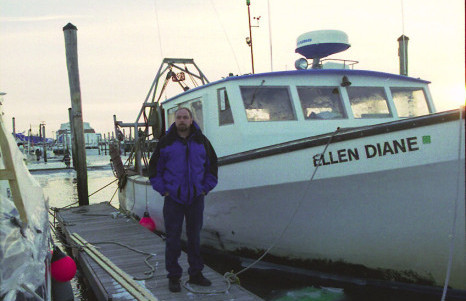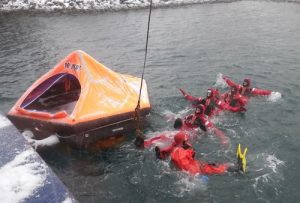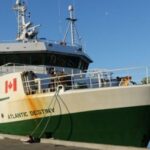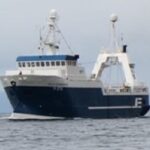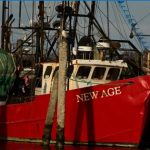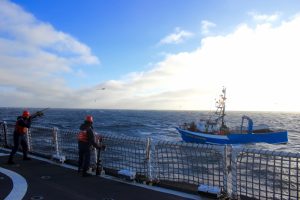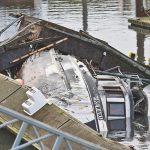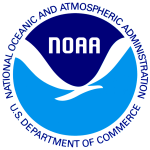Tag Archives: federal government
Feds & NJ Rushed Offshore Wind – Now It’s Falling Apart! Court Ruling Highlights Oversight Deficiencies!
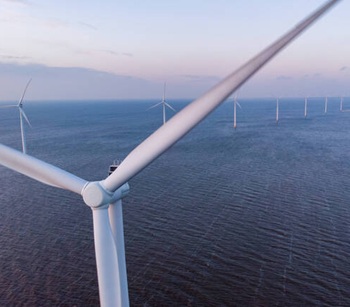 After nine months of covering offshore wind energy developments along the Jersey Coast, three glaring issues have emerged over that time—each fueling opposition to the federal and state-backed offshore wind plan: lack of due diligence, rushed approvals, and the bigger is better mentality. Governor Murphy encapsulated this ambition, declaring, “Welcome to NJ, the Nation’s Center of Offshore Wind.” But with mounting setbacks—including a recent court ruling revoking a critical permit—the cracks in this fast-tracked initiative are becoming impossible to ignore. The future of offshore wind development in New Jersey has been dealt yet another significant blow following a recent ruling from the Environmental Appeals Board. On March 14, the board decided to revoke the Clean Air Act permit for the Atlantic Shores wind turbine project, a move that U.S. Representative Chris Smith (R-NJ) described as “another nail in the coffin” for the initiative. more, >>CLICK TO READ<< 07:15
After nine months of covering offshore wind energy developments along the Jersey Coast, three glaring issues have emerged over that time—each fueling opposition to the federal and state-backed offshore wind plan: lack of due diligence, rushed approvals, and the bigger is better mentality. Governor Murphy encapsulated this ambition, declaring, “Welcome to NJ, the Nation’s Center of Offshore Wind.” But with mounting setbacks—including a recent court ruling revoking a critical permit—the cracks in this fast-tracked initiative are becoming impossible to ignore. The future of offshore wind development in New Jersey has been dealt yet another significant blow following a recent ruling from the Environmental Appeals Board. On March 14, the board decided to revoke the Clean Air Act permit for the Atlantic Shores wind turbine project, a move that U.S. Representative Chris Smith (R-NJ) described as “another nail in the coffin” for the initiative. more, >>CLICK TO READ<< 07:15
Indigenous fishers, co-operatives are winners in Ottawa’s shuffle of baby eel quotas
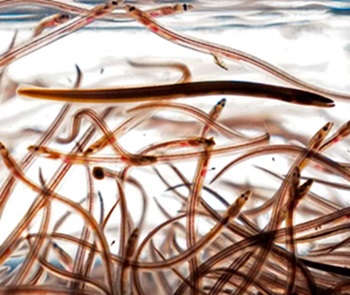 Ottawa has issued the latest version of how it is proposing to distribute licences for the lucrative baby eel fishery in the Maritimes. In a letter to stakeholders on Monday, the Fisheries Department says it is maintaining its plan to shift half the quota of close to 10,000 kilograms of elvers away from nine large licence holders to new entrants from Indigenous communities. However, Ottawa confirms it is backing away from a pilot project to redistribute 27 per cent of the catch of the nine licence holders to 120 fishers who used to work for them. That old pilot proposal, introduced in December, drew strong criticism from the potential recipients, who said they preferred to remain employees and felt safer on the rivers under the existing arrangement. more, >>CLICK TO READ<< 15:33
Ottawa has issued the latest version of how it is proposing to distribute licences for the lucrative baby eel fishery in the Maritimes. In a letter to stakeholders on Monday, the Fisheries Department says it is maintaining its plan to shift half the quota of close to 10,000 kilograms of elvers away from nine large licence holders to new entrants from Indigenous communities. However, Ottawa confirms it is backing away from a pilot project to redistribute 27 per cent of the catch of the nine licence holders to 120 fishers who used to work for them. That old pilot proposal, introduced in December, drew strong criticism from the potential recipients, who said they preferred to remain employees and felt safer on the rivers under the existing arrangement. more, >>CLICK TO READ<< 15:33
Jamie Sarkonak: Feds’ racial politics have plunged Canadian fisheries into chaos
 There are Indigenous fishers, and there are non-Indigenous fishers — and every year, the federal government takes more and more away from one to give to the other, citing reconciliation and an ever-expanding notion of Indigenous rights. Up until last week, the 2025 edition of this game of racial redistribution involved the Liberal government planning to take away between 75 and 90 per cent of the commercial American eel quota and giving 50 per cent to First Nations in Atlantic Canada, with another 27 per cent going to employees of those who already have eel licences. Eel fishers were only saved by a last-minute cancellation of the changes on Thursday, when Fisheries Minister Diane Lebouthillier came to her senses and called it off. Indeed, in 2021, commercial crab fishers in one fishing zone of British Columbia had half of their trapping allocation taken by the government and redistributed to Indigenous people to assist them in earning a “moderate livelihood.” more, >>CLICK TO READ<< 06:46
There are Indigenous fishers, and there are non-Indigenous fishers — and every year, the federal government takes more and more away from one to give to the other, citing reconciliation and an ever-expanding notion of Indigenous rights. Up until last week, the 2025 edition of this game of racial redistribution involved the Liberal government planning to take away between 75 and 90 per cent of the commercial American eel quota and giving 50 per cent to First Nations in Atlantic Canada, with another 27 per cent going to employees of those who already have eel licences. Eel fishers were only saved by a last-minute cancellation of the changes on Thursday, when Fisheries Minister Diane Lebouthillier came to her senses and called it off. Indeed, in 2021, commercial crab fishers in one fishing zone of British Columbia had half of their trapping allocation taken by the government and redistributed to Indigenous people to assist them in earning a “moderate livelihood.” more, >>CLICK TO READ<< 06:46
Ottawa scraps elver fishery quota redistribution plan after backlash
 The federal government is no longer moving forward with its plan to redistribute the wealth of Nova Scotia’s baby eel harvest from large licence holders to individual fishers after receiving backlash from the industry. A statement from Fisheries Minister Diane Lebouthillier’s office said the minister reached the decision after listening to feedback from stakeholders in consultations held by the Department of Fisheries and Oceans (DFO) in recent weeks. A subsequent letter from the DFO in December to fishers detailing the planned redistribution said the nine commercial licensees that dominate the fishery would lose between 60 per cent and 90 per cent of their quotas, without compensation from the federal government. Video, more, >>CLICK TO READ<< 16:45
The federal government is no longer moving forward with its plan to redistribute the wealth of Nova Scotia’s baby eel harvest from large licence holders to individual fishers after receiving backlash from the industry. A statement from Fisheries Minister Diane Lebouthillier’s office said the minister reached the decision after listening to feedback from stakeholders in consultations held by the Department of Fisheries and Oceans (DFO) in recent weeks. A subsequent letter from the DFO in December to fishers detailing the planned redistribution said the nine commercial licensees that dominate the fishery would lose between 60 per cent and 90 per cent of their quotas, without compensation from the federal government. Video, more, >>CLICK TO READ<< 16:45
Trump to Rescue Maine’s Lobstermen
 The end is coming for overregulation – including fisheries. Good ideas can become excessive, necessitating curtailment, and a restoration of balance. Maine’s lobstermen – pounded by regulations – represent a shocking example of industry overregulation. Trump is about to save them. Even before last week, Maine’s lobstermen were suffering. In my youth, growing up in Maine limits on who, how, and where one lobstered were largely self-set, lobstermen knowing well where they put their traps, respecting others, one trap per line, and no overfishing. The reason for respect among lobstermen, no overfishing, limits what was kept (no breeders, no shorts), how many traps, when seasons started and finished, was self-preservation. Boats were handed from fathers to sons, sometimes daughters, with respect for the sea. more, >>CLICK TO READ<< 15:21 By Robert Charles
The end is coming for overregulation – including fisheries. Good ideas can become excessive, necessitating curtailment, and a restoration of balance. Maine’s lobstermen – pounded by regulations – represent a shocking example of industry overregulation. Trump is about to save them. Even before last week, Maine’s lobstermen were suffering. In my youth, growing up in Maine limits on who, how, and where one lobstered were largely self-set, lobstermen knowing well where they put their traps, respecting others, one trap per line, and no overfishing. The reason for respect among lobstermen, no overfishing, limits what was kept (no breeders, no shorts), how many traps, when seasons started and finished, was self-preservation. Boats were handed from fathers to sons, sometimes daughters, with respect for the sea. more, >>CLICK TO READ<< 15:21 By Robert Charles
d’Entremont talks fishery mismanagement, violence in Clare
The MP for West Nova says fishery disputes were top of mind in 2024. Conservative Chris d’Entremont says the federal government has mismanaged the herring and elver fishery and have not been properly enforcing illegal lobster fishing in Clare. He says Minister Diane Lebouthillier is too worried about her own riding in Quebec. “Fishery-wise, 2024 wasn’t the year we wanted. I was hoping we’d have some ears that would listen to us. We continue to get pushed aside for political reasons,” said d’Entremont. d’Entremont says southwest Nova didn’t get a cent out of Small Craft Harbour funding, with 60-70 percent of it going to the minister’s riding. more, >>CLICK TO READ<< 12:50
federal government has mismanaged the herring and elver fishery and have not been properly enforcing illegal lobster fishing in Clare. He says Minister Diane Lebouthillier is too worried about her own riding in Quebec. “Fishery-wise, 2024 wasn’t the year we wanted. I was hoping we’d have some ears that would listen to us. We continue to get pushed aside for political reasons,” said d’Entremont. d’Entremont says southwest Nova didn’t get a cent out of Small Craft Harbour funding, with 60-70 percent of it going to the minister’s riding. more, >>CLICK TO READ<< 12:50
Sipekne’katik claims ‘significant progress’ in talks with Ottawa over controversial N.S. lobster fishery
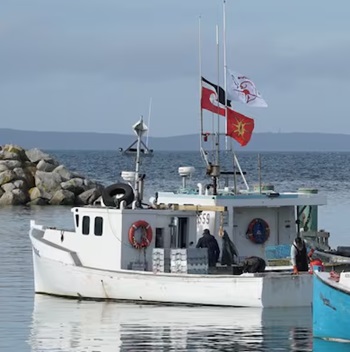 The First Nation at the centre of a highly contentious out-of-season lobster fishery in southwest Nova Scotia says mediation with the federal government is bearing fruit, with lengthy meetings between both sides leading to the first “meaningful dialogue” in 25 years. The comments from the lawyer for Sipekne’katik First Nation come in a letter to a Nova Scotia Supreme Court judge that asks that litigation launched by the band against the federal government in 2021 be paused for another six months to allow negotiations to continue. The two sides, along with intervenor Unified Fisheries Conservation Alliance, which represents commercial fishing interests, are expected to discuss the time extension in court this morning. more, >>CLICK TO READ<< 08:02
The First Nation at the centre of a highly contentious out-of-season lobster fishery in southwest Nova Scotia says mediation with the federal government is bearing fruit, with lengthy meetings between both sides leading to the first “meaningful dialogue” in 25 years. The comments from the lawyer for Sipekne’katik First Nation come in a letter to a Nova Scotia Supreme Court judge that asks that litigation launched by the band against the federal government in 2021 be paused for another six months to allow negotiations to continue. The two sides, along with intervenor Unified Fisheries Conservation Alliance, which represents commercial fishing interests, are expected to discuss the time extension in court this morning. more, >>CLICK TO READ<< 08:02
It’s Time to Abandon UMaine’s Offshore Wind Scheme in Favor of Cheaper Alternatives
 The federal government this week blocked a proposal that would have allowed the Mills Administration and labor unions to bulldoze Sears Island into an industrial wind power port. Although this hard-fought victory is good news for fishermen, ratepayers, taxpayers, and the environment, it’s only temporary. The Mills Administration has given no indication that it will stop its relentless pursuit of expensive and unworkable offshore wind schemes. Depending on how Election Day turns out, the Legislature could be back at the drawing board devising other ways to enrich the wind turbine industry and destroy pristine ocean environments. So it’s worth remembering how we got here, and how Maine’s institutions and media became witting and unwitting pawns in an expensive game of crony capitalism. more, >>CLICK TO READ<< 06:35
The federal government this week blocked a proposal that would have allowed the Mills Administration and labor unions to bulldoze Sears Island into an industrial wind power port. Although this hard-fought victory is good news for fishermen, ratepayers, taxpayers, and the environment, it’s only temporary. The Mills Administration has given no indication that it will stop its relentless pursuit of expensive and unworkable offshore wind schemes. Depending on how Election Day turns out, the Legislature could be back at the drawing board devising other ways to enrich the wind turbine industry and destroy pristine ocean environments. So it’s worth remembering how we got here, and how Maine’s institutions and media became witting and unwitting pawns in an expensive game of crony capitalism. more, >>CLICK TO READ<< 06:35
Feds deny Maine’s request for $456M to help build offshore wind port
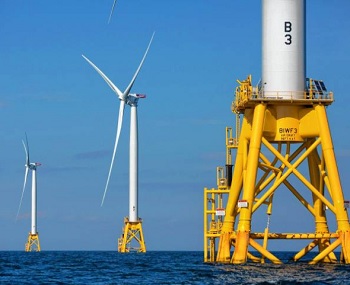 The federal government turned down Maine’s request for a $456 million grant that would cover most of the cost of building an offshore wind port on Sears Island, officials confirmed Tuesday. The Maine Department of Transportation had applied in May for $456 million from a competitive federal fund focused on multimodal transportation. Following protests from environmentalists, tribes and Republicans, the state picked Sears Island over nearby Mack Point earlier this year for the staging area of the offshore wind port and said the project will cost $760 million. more, >>CLICK TO READ<< 15:05
The federal government turned down Maine’s request for a $456 million grant that would cover most of the cost of building an offshore wind port on Sears Island, officials confirmed Tuesday. The Maine Department of Transportation had applied in May for $456 million from a competitive federal fund focused on multimodal transportation. Following protests from environmentalists, tribes and Republicans, the state picked Sears Island over nearby Mack Point earlier this year for the staging area of the offshore wind port and said the project will cost $760 million. more, >>CLICK TO READ<< 15:05
Tribal groups, seeking restrictions on Alaska’s Bering Sea trawlers, get day in court
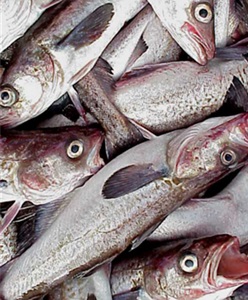 U.S. District Court Judge Sharon Gleason heard oral arguments Thursday in a lawsuit filed by two of Alaska’s largest tribal groups against federal managers of the state’s groundfish trawl fisheries. The Association of Village Council Presidents and the Tanana Chiefs Conference claim the federal government has failed to adjust trawling rules in the Bering Sea and off the Aleutian Islands to compensate for the ongoing salmon crisis on Alaska’s Interior rivers. Victory by the plaintiffs could lead to new restrictions on the world’s largest trawl fishery. If plaintiffs lose, the status quo is likely to continue. On Thursday, Gleason asked plaintiffs whether they’re seeking a halt to trawl fishing in the Bering Sea. No, the plaintiffs said. more, >>CLICK TO READ<< 11:27
U.S. District Court Judge Sharon Gleason heard oral arguments Thursday in a lawsuit filed by two of Alaska’s largest tribal groups against federal managers of the state’s groundfish trawl fisheries. The Association of Village Council Presidents and the Tanana Chiefs Conference claim the federal government has failed to adjust trawling rules in the Bering Sea and off the Aleutian Islands to compensate for the ongoing salmon crisis on Alaska’s Interior rivers. Victory by the plaintiffs could lead to new restrictions on the world’s largest trawl fishery. If plaintiffs lose, the status quo is likely to continue. On Thursday, Gleason asked plaintiffs whether they’re seeking a halt to trawl fishing in the Bering Sea. No, the plaintiffs said. more, >>CLICK TO READ<< 11:27
Federal government will hold first-ever offshore wind auction off the Oregon coast in October
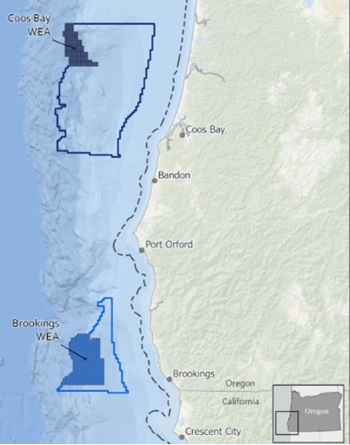 The federal government says it will hold Oregon’s first-ever offshore wind energy lease sale in mid-October to auction two areas where developers can build floating wind turbines. The announcement by the U.S. Department of the Interior on Thursday cements the development of offshore wind in Oregon despite vehement opposition from coastal communities, the state’s fishing industry and local tribes who say the process was rushed and ignored local input. The auction, to be held by the Bureau of Ocean Energy Management on Oct. 15, will include two areas totaling nearly 195,000 acres. The Coos Bay lease area consists of 61,203 acres and is about 32 miles from shore and the Brookings lease area is 133,792 acres and around 18 miles from shore. more, >>CLICK TO READ<< 08:56
The federal government says it will hold Oregon’s first-ever offshore wind energy lease sale in mid-October to auction two areas where developers can build floating wind turbines. The announcement by the U.S. Department of the Interior on Thursday cements the development of offshore wind in Oregon despite vehement opposition from coastal communities, the state’s fishing industry and local tribes who say the process was rushed and ignored local input. The auction, to be held by the Bureau of Ocean Energy Management on Oct. 15, will include two areas totaling nearly 195,000 acres. The Coos Bay lease area consists of 61,203 acres and is about 32 miles from shore and the Brookings lease area is 133,792 acres and around 18 miles from shore. more, >>CLICK TO READ<< 08:56
Maine’s mysterious floating wind research
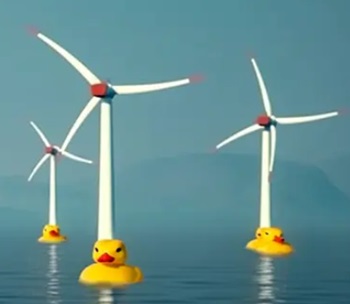 The State of Maine just got a very strange offshore wind lease from the Feds. They call it a research lease as opposed to a commercial development lease. It has some mysterious features that are worth pondering. There may even be a many billion-dollar trick here. We consider that at the end, after briefly explaining the mysteries. To begin with, the lease is for a 144 MW “research array” of turbines, as it is called. Well, 144 MW is huge for research. The South Fork Wind site (fixed, not floating) that is already running is a 12-turbine, 132 MW commercial facility, so this array will be bigger than commercial. It could cost $3 billion-plus the cost of the factory to make the dozen or so floaters. Different websites suggest different turbine sizes from 10 to 12 MW. Of course, if this is really research, they might use a variety of sizes, but the total is still huge. more, >>CLICK TO READ<< 12:14
The State of Maine just got a very strange offshore wind lease from the Feds. They call it a research lease as opposed to a commercial development lease. It has some mysterious features that are worth pondering. There may even be a many billion-dollar trick here. We consider that at the end, after briefly explaining the mysteries. To begin with, the lease is for a 144 MW “research array” of turbines, as it is called. Well, 144 MW is huge for research. The South Fork Wind site (fixed, not floating) that is already running is a 12-turbine, 132 MW commercial facility, so this array will be bigger than commercial. It could cost $3 billion-plus the cost of the factory to make the dozen or so floaters. Different websites suggest different turbine sizes from 10 to 12 MW. Of course, if this is really research, they might use a variety of sizes, but the total is still huge. more, >>CLICK TO READ<< 12:14
Newly reinstated Newfoundland cod fishery temporarily paused as landings hit limit
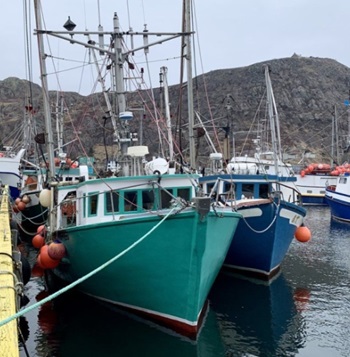 The federal government has temporarily paused parts of the newly reinstated commercial northern cod fishery off the east coast of Newfoundland as landings approach the seasonal limit. Fisheries and Oceans Canada says that as of Monday evening, fishers from the east coast of the island cannot fish cod until Sept. 15, when the second half of the season is set to begin. The first half of the season was set to end on Sept. 14, but officials say fishers have almost caught the maximum amount of fish allowed during that period. Labrador fishers will be confined to the region’s southeast coast until Sept. 15. more, >>CLICK TO READ<< 17:23
The federal government has temporarily paused parts of the newly reinstated commercial northern cod fishery off the east coast of Newfoundland as landings approach the seasonal limit. Fisheries and Oceans Canada says that as of Monday evening, fishers from the east coast of the island cannot fish cod until Sept. 15, when the second half of the season is set to begin. The first half of the season was set to end on Sept. 14, but officials say fishers have almost caught the maximum amount of fish allowed during that period. Labrador fishers will be confined to the region’s southeast coast until Sept. 15. more, >>CLICK TO READ<< 17:23
Furey says changes to cod catch are an ‘affront’ to N.L. in letter to federal fisheries minister
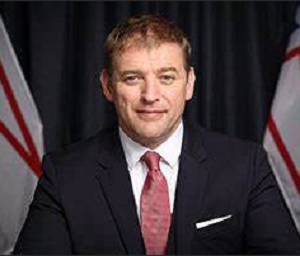 In a letter to Diane Lebouthillier, dated July 3, Furey says the provincial government is concerned about the changes, announced June 26. “Changes that provide increased access to foreign fleets, coupled with the risk of overfishing, are an affront to the patience and commitment to stewardship demonstrated by the hardworking harvesters and processors of this province,” says Furey in the letter, posted to X, formerly known as Twitter. “The province simply cannot support fish being harvested by foreign countries at the expense of our own harvesters.” Furey’s letter is the latest public rebuke by N.L.’s Liberal government — currently the only provincial Liberal administration in the country — of the federal Liberals. more, >>CLICK TO READ<< 14:51
In a letter to Diane Lebouthillier, dated July 3, Furey says the provincial government is concerned about the changes, announced June 26. “Changes that provide increased access to foreign fleets, coupled with the risk of overfishing, are an affront to the patience and commitment to stewardship demonstrated by the hardworking harvesters and processors of this province,” says Furey in the letter, posted to X, formerly known as Twitter. “The province simply cannot support fish being harvested by foreign countries at the expense of our own harvesters.” Furey’s letter is the latest public rebuke by N.L.’s Liberal government — currently the only provincial Liberal administration in the country — of the federal Liberals. more, >>CLICK TO READ<< 14:51
Sipekne’katik First Nation, federal government to begin mediation in effort to settle fishing dispute
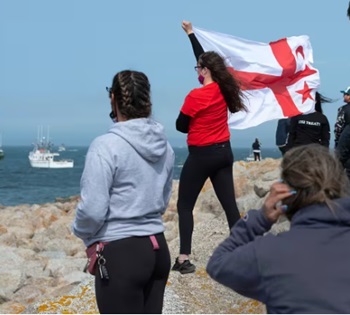 Litigation scheduled for next year that could have helped settle outstanding questions about treaty fishing rights related to the Marshall decisions will no longer happen, after a Nova Scotia Supreme Court judge granted a joint request from Sipekne’katik First Nation and the Attorney General of Canada to instead focus on mediation. The decision stems from a lawsuit Sipekne’katik filed in 2021 that wanted a declaration from the court that the federal Fisheries Act and regulations infringe on the treaty right to fish lobster for a moderate livelihood. That includes the prohibition on catching and holding lobsters without a licence and fishing outside of a commercial season. The trial was to start in May 2025, but this April, just as witness discovery was set to begin, the two parties served notice to the court that they’d reached an agreement to focus instead on mediation. They filed a joint request to have the trial dates and all other pretrial milestones adjourned. more, >>CLICK TO READ<< 12:37
Litigation scheduled for next year that could have helped settle outstanding questions about treaty fishing rights related to the Marshall decisions will no longer happen, after a Nova Scotia Supreme Court judge granted a joint request from Sipekne’katik First Nation and the Attorney General of Canada to instead focus on mediation. The decision stems from a lawsuit Sipekne’katik filed in 2021 that wanted a declaration from the court that the federal Fisheries Act and regulations infringe on the treaty right to fish lobster for a moderate livelihood. That includes the prohibition on catching and holding lobsters without a licence and fishing outside of a commercial season. The trial was to start in May 2025, but this April, just as witness discovery was set to begin, the two parties served notice to the court that they’d reached an agreement to focus instead on mediation. They filed a joint request to have the trial dates and all other pretrial milestones adjourned. more, >>CLICK TO READ<< 12:37
The federal government is assuming management of salmon fishing in parts of Alaska’s Cook Inlet
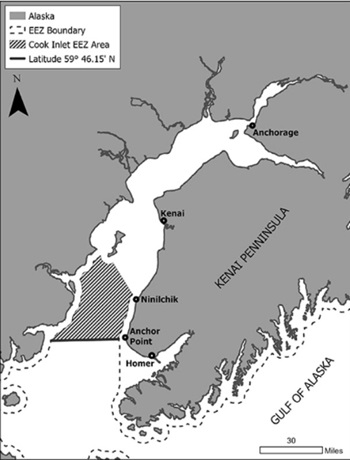 Commercial and recreational salmon fishing in the federal waters of Cook Inlet will resume this summer, but under new management by the federal government, according to a rule made final this week. Until now, the state had managed salmon fisheries in both state and federal waters of the inlet. But the switch in management was ordered by federal courts, as a result of litigation stretching back a decade. The United Cook Inlet Drift Association, or UCIDA, which is made up of commercial salmon fishers, sued the federal government in 2013 for failing to develop a salmon harvest management plan for the federal waters of the inlet. more, >>CLICK TO READ<< 13:11
Commercial and recreational salmon fishing in the federal waters of Cook Inlet will resume this summer, but under new management by the federal government, according to a rule made final this week. Until now, the state had managed salmon fisheries in both state and federal waters of the inlet. But the switch in management was ordered by federal courts, as a result of litigation stretching back a decade. The United Cook Inlet Drift Association, or UCIDA, which is made up of commercial salmon fishers, sued the federal government in 2013 for failing to develop a salmon harvest management plan for the federal waters of the inlet. more, >>CLICK TO READ<< 13:11
NL Harvesters Say Thanks For Nothing, Bait Fishery Slap in the Face to License Holders
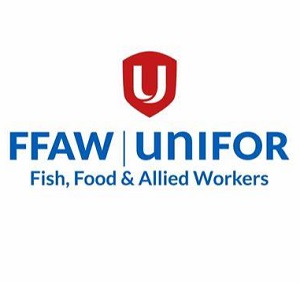 This morning, the federal government announced a bait fishery for Atlantic mackerel in Atlantic Canada and Quebec. A bait fishery for mackerel will do nothing for harvesters in Newfoundland and Labrador, and harvesters are demanding a modest directed commercial quota for the province. “Newfoundland and Labrador has a history of a fully monitored directed fishery that provided top quality product in a traditionally fall fishery. FFAW-Unifor’s proposal for a directed fishery with temporal coverage would bridge the existing information gaps,” says FFAW-Unifor Secretary-Treasurer Jason Spingle. “Moreover, today’s release is not clear what portion Newfoundland and Labrador harvesters would receive and when,” Spingle says. more, >>CLICK TO READ<< 13:36
This morning, the federal government announced a bait fishery for Atlantic mackerel in Atlantic Canada and Quebec. A bait fishery for mackerel will do nothing for harvesters in Newfoundland and Labrador, and harvesters are demanding a modest directed commercial quota for the province. “Newfoundland and Labrador has a history of a fully monitored directed fishery that provided top quality product in a traditionally fall fishery. FFAW-Unifor’s proposal for a directed fishery with temporal coverage would bridge the existing information gaps,” says FFAW-Unifor Secretary-Treasurer Jason Spingle. “Moreover, today’s release is not clear what portion Newfoundland and Labrador harvesters would receive and when,” Spingle says. more, >>CLICK TO READ<< 13:36
Alaska delusions – The great takeover of federal waters
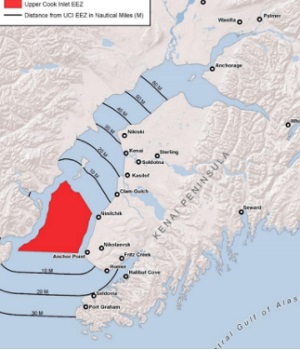 Oh if only the facts were as a trio of Alaska House legislators would like their colleagues to believe. They’ve drafted a resolution calling on Congress to extend state waters to 15 miles off the coast of Alaska because this would serve the state’s interest in supporting a “seafood industry generat(ing) over $163,000,000 in revenue for state and local governments.” All those zeros make that look like a great deal of money, but in terms of state revenue, $163 million is chicken feed. The state’s now fading oil industry is forecast to produce $3 billion in fiscal year 2024 or almost 20 times more, according to state projections. Worse though, the claim to $163 million in state revenue from the fishing industry comes from a report compiled for the Alaska Seafood Marketing Institute (ASMI) that is badly outdated, and the resolution now based on that report lacks the context which even the seafood sales promotion organization felt compelled to add. more, >>CLICK TO READ<< 08:56
Oh if only the facts were as a trio of Alaska House legislators would like their colleagues to believe. They’ve drafted a resolution calling on Congress to extend state waters to 15 miles off the coast of Alaska because this would serve the state’s interest in supporting a “seafood industry generat(ing) over $163,000,000 in revenue for state and local governments.” All those zeros make that look like a great deal of money, but in terms of state revenue, $163 million is chicken feed. The state’s now fading oil industry is forecast to produce $3 billion in fiscal year 2024 or almost 20 times more, according to state projections. Worse though, the claim to $163 million in state revenue from the fishing industry comes from a report compiled for the Alaska Seafood Marketing Institute (ASMI) that is badly outdated, and the resolution now based on that report lacks the context which even the seafood sales promotion organization felt compelled to add. more, >>CLICK TO READ<< 08:56
Federal Government Picks New England Offshore Wind Power Site, Drawing Cheers and Questions Alike
 The federal government on Friday designated a large area off the New England coast for offshore wind production development, setting the stage for a possible lease sale within the Gulf of Maine. The U.S. Bureau of Ocean Energy Management said in a statement that the New England zone, which renewable energy advocates have identified as crucial for the growth of wind power, “avoids important areas for lobster fishing, North Atlantic right whale habitat, and other important fishing areas and habitats.” The move came a day after the country’s first commercial-scale offshore wind farm opened off Montauk Point, New York. Environmental groups cheered the announcement, but some members of the commercial fishing industry, which has opposed wind development in areas where they trap lobsters, said they still have concerns about locating offshore wind in the area. more, >>click to read<< 12:23
The federal government on Friday designated a large area off the New England coast for offshore wind production development, setting the stage for a possible lease sale within the Gulf of Maine. The U.S. Bureau of Ocean Energy Management said in a statement that the New England zone, which renewable energy advocates have identified as crucial for the growth of wind power, “avoids important areas for lobster fishing, North Atlantic right whale habitat, and other important fishing areas and habitats.” The move came a day after the country’s first commercial-scale offshore wind farm opened off Montauk Point, New York. Environmental groups cheered the announcement, but some members of the commercial fishing industry, which has opposed wind development in areas where they trap lobsters, said they still have concerns about locating offshore wind in the area. more, >>click to read<< 12:23
State lawsuit claims federal government owes Alaska $700 billion for quashing Pebble mine
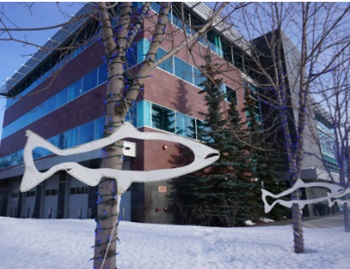 The federal government owes Alaska more than $700 billion in compensation for the 2023 Environmental Protection Agency action that blocked development of the massive and controversial Pebble Mine in Southwest Alaska, Gov. Mike Dunleavy’s administration claims in a lawsuit filed in a federal court. The lawsuit, filed Thursday in the U.S. Court of Federal Claims in the District of Columbia, is part of a flurry of legal actions by the state and the mine’s would-be developer that seek to revive the massive copper and gold project. In its complaint filed Thursday with the U.S. Court of Federal Claims, the state cited an estimate for 100 years of production to support the $700 billion figure. And it said Alaska had been depending on Pebble development for its economic future. more, >>click to read<< 09:26
The federal government owes Alaska more than $700 billion in compensation for the 2023 Environmental Protection Agency action that blocked development of the massive and controversial Pebble Mine in Southwest Alaska, Gov. Mike Dunleavy’s administration claims in a lawsuit filed in a federal court. The lawsuit, filed Thursday in the U.S. Court of Federal Claims in the District of Columbia, is part of a flurry of legal actions by the state and the mine’s would-be developer that seek to revive the massive copper and gold project. In its complaint filed Thursday with the U.S. Court of Federal Claims, the state cited an estimate for 100 years of production to support the $700 billion figure. And it said Alaska had been depending on Pebble development for its economic future. more, >>click to read<< 09:26
Put rules in writing to fix Maritime elver fishery’s enforcement problem, say businesses
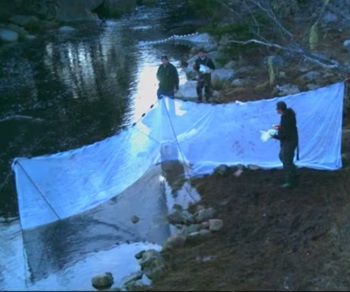 Representatives of the $45-million Maritime elver fishery are calling on the federal government to implement enforceable regulations for moderate livelihood fishing by Indigenous people. They told a Senate committee in Ottawa Thursday the failure to define or regulate moderate livelihood rights by the Department of Fisheries and Oceans (DFO) is one reason for the uncontrolled harvest of baby eels on dozens of rivers in Nova Scotia and New Brunswick. “Among these poachers are First Nations unwilling to work with DFO to access the fishery under a banner of moderate livelihood rights, backed by organized crime, specifically biker gangs and foreign smuggling networks. Our once peaceful industry has recently faced violent disruption,” said Genna Carey, a commercial licence holder speaking on behalf of the Canadian Committee for a Sustainable Eel Fishery, an industry group. more, >>click to read<< 09:29
Representatives of the $45-million Maritime elver fishery are calling on the federal government to implement enforceable regulations for moderate livelihood fishing by Indigenous people. They told a Senate committee in Ottawa Thursday the failure to define or regulate moderate livelihood rights by the Department of Fisheries and Oceans (DFO) is one reason for the uncontrolled harvest of baby eels on dozens of rivers in Nova Scotia and New Brunswick. “Among these poachers are First Nations unwilling to work with DFO to access the fishery under a banner of moderate livelihood rights, backed by organized crime, specifically biker gangs and foreign smuggling networks. Our once peaceful industry has recently faced violent disruption,” said Genna Carey, a commercial licence holder speaking on behalf of the Canadian Committee for a Sustainable Eel Fishery, an industry group. more, >>click to read<< 09:29
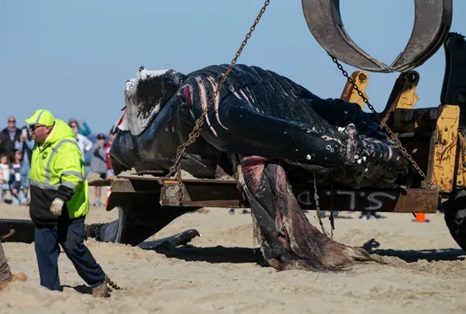
Whales and other marine life are still dying. The crisis at the NJ Shore remains urgent
It’s worth noting that it has been a full year since coastal residents realized that there was something amiss in our oceans — the start of a frightening number of whale and dolphin deaths. In the New Jersey and New York area alone, there have been 38 whales and 60 dolphins and porpoises washed ashore. That’s 98 endangered marine mammals found dead. That’s almost two marine mammals per week, while others have sunk to the bottom of the ocean. Meanwhile, the federal agencies responsible to protect marine mammals have neglected their responsibility, and turned down opportunities to cooperate, be transparent and engage in meaningful dialogue. Video, more, >>click to read<< 11:48
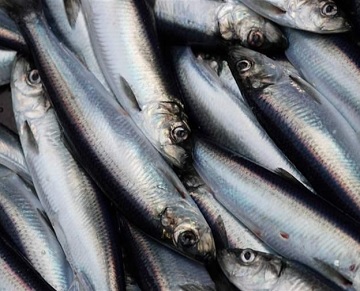
Herring fishermen get money after decline of fish, quota cuts
Fishermen in Maine’s historic herring fishing business will receive money from the federal government to help cope with a decline in the fish’s population that has caused the industry to struggle. The government has appropriated $7 million for the fishermen, the Maine Department of Marine Resources said Wednesday. Atlantic herring were found to be overfished via a 2020 scientific assessment, and fishing quotas were slashed after that. The nation’s catch of Atlantic herring has plummeted in the face of quota cuts and concern over the health of the stock. The loss of herring has led to a bait crunch for lobster fishermen, who have had to seek other sources of bait for traps. >click to read< 09:26
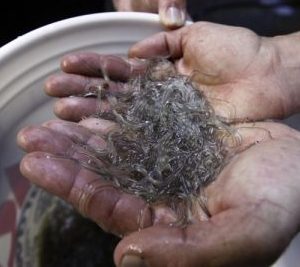
Canada gives Mi’kmaq 14% of lucrative Maritime elver fishery for 2nd year
For a second year, the federal government is giving Mi’kmaw First Nations 14 per cent of the lucrative Maritime fishery for baby eels — or elvers — without compensating commercial licence holders. The transfer implements the Mi’kmaw treaty right to fish for a moderate living, but also sets the stage for further court challenges by commercial elver licence holders. “I’m quite confident that we will be taking legal action based on this again,” said Michel Samson, a lawyer representing Wine Harbour Fisheries. Wine Harbour is one of several licence holders in federal court trying to overturn the 2022 decision, saying it was unfair and rushed. >click to read< 08:59
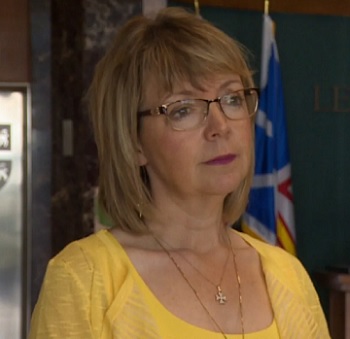
N.L. asks federal government for ‘immediate’ improvements to Labrador search and rescue
Labrador Affairs Minister Lisa Dempster said Friday the statement was about following up on the 17 recommendations made by the provincial public inquiry into ground search and rescue operations, in its report released in November 2021. “This statement is applying pressure for the federal government to come forward and address some of the gaps that were identified in the inquiry that was just finished,” Dempster said. “We have around 9,000 kilometres of coastline on the island, for example, and we have more than 17,000 kilometres of coastline around Labrador and we have no resources based in Labrador.” >click to read< 14:09
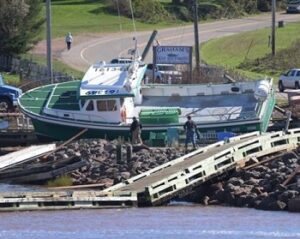
Ottawa earmarks $100 million for lost fishing gear, repair to harbours – $300-million fund for Atlantic Canada not enough, fishermen say
The federal government says $100 million from its hurricane Fiona fund will be earmarked for the recovery of lost fishing gear and the repair to small-craft harbours across Atlantic Canada and eastern Quebec. The federal Fisheries Department says in a news release the money will come from the $300 million Ottawa set aside for fishers, communities and companies affected by post-tropical storm Fiona, which made landfall on Sept. 24. >click to read< $300-million fund for Atlantic Canada not enough, fishermen say – Fishermen on P.E.I. say the federal government’s $300-million fund for Atlantic Canada is a good start to recover from post-tropical storm Fiona but falls far short of what is needed. It will cost millions just to fix the wharf at Covehead Harbour alone, said Allan Coady. >click to read< 09:26
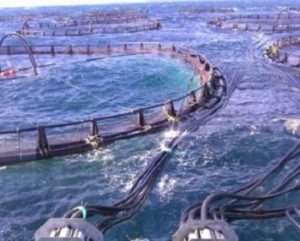
Don’t Cage Our Oceans: Fish farming may threaten rare Gulf whale
The site approved for the Velella Epsilon fish farm in federal waters west of Venice is one of just three potential aquaculture opportunity areas under consideration off Florida’s Gulf coast. There are six others — three in the central Gulf south of Louisiana and Mississippi and three east of Texas — as well as 10 in the Pacific Ocean off the California coast. It’s part of a collusive effort between fish farming companies and the federal government to divide up national waters for profit, James Mitchell, legislative director of Don’t Cage Our Oceans, said. >click to read< 13:49
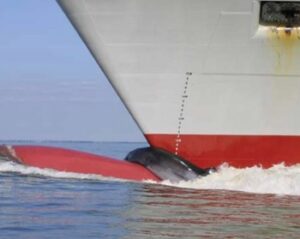
Ship Strikes: Ships must slow down more often to save whales, feds say
Vessels off the East Coast must slow down more often to help save a vanishing species of whale from extinction, the federal government said Friday. Efforts to save the whales have long focused on fishing gear, especially that used by East Coast lobster fishermen. The proposed vessel speed rules signal that the government wants the shipping industry to take more responsibility. “Changes to the existing vessel speed regulation are essential to stabilize the ongoing right whale population decline and prevent the species’ extinction,” state the proposed rules, which are slated to be published in the federal register. Fishermen are unfairly being held accountable for whale deaths that occur due to vessel strikes, said Patrice McCarron, executive director of the Maine Lobstermen’s Association, which is the largest fishing industry association on the East Coast. >click to read< 11:33


































